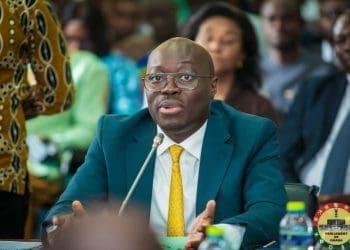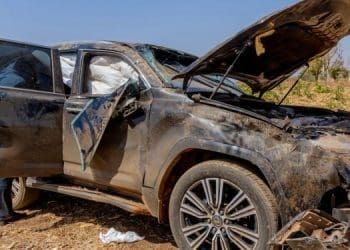Meghan Markle’s frantic insistence on the title of Duchess is an attempt to imprint her family’s royal connections on the public before their inevitable removal.
The Harper’s Bazaar interview with Meghan, the Duchess of Sussex, which appeared this week, was meant to be a triumphant finger aimed at the British royals.
Released on the very day that Prince William and Princess Catherine signified their increased responsibility by attending the Royal Variety Performance, this clear attempt to overshadow them was Meghan’s most extraordinary own-goal yet.
The world ignored the tedious girl-boss platitudes and instead revelled in her insistence that everyone around her use her full royal title, even in situations where it made no sense.
A house manager announcing “Meghan, Duchess of Sussex” to a lone journalist grabbed headlines. Less widely noted was that the article opens with Meghan insisting on the same treatment when meeting a group of schoolchildren at the La Brea Tar Pits.
It was absurd. For a sense of how cringey such behaviour would be to a born and bred British aristocrat, look at Jane Percy, who told the Telegraph this week she rarely uses her “Duchess of Northumberland” title. “Unlike other duchesses who put their names everywhere, I’m not using my title,” she said, pointedly. “One or two duchesses haven’t really helped the cause lately.”
For The Royalist, the subtext of the past fortnight is that Meghan’s behaviour increasingly looks less like confidence and more like pre-emptive branding.
As The Royalist was first to report, the removal of Harry and Meghan’s titles by the future King William is not hypothetical. As William made clear to Eugene Levy, big changes are coming. Recent events concerning Andrew Mountbatten-Windsor have only made that outcome more likely.
Meghan, belatedly, appears to have woken up to the direction of travel. Before Andrew, the argument was that divine right meant that royal titles could never be taken away (a claim The Royalist always said was nonsense). Post-Andrew, the question has become, why should all these other people keep their titles?
Meghan’s strategy is to use the titles more, not less, across the private, commercial, and PR planes of her existence, to try and imprint them on the public mind. The same applies to her use of th Harper’s Bazaar set the seal on two particularly bad weeks for the Sussexes, beginning with the Kardashian party debacle, a small drama that nonetheless cut to the heart of the couple’s increasingly brittle relationship with the internet.
The conversation became less about a non-existent consent form and more about why anyone would lie about something so easily disproved. The surname “Sussex.”
The Harper’s Bazaar piece compounded rather than offset the problem. The interview was controlled but not convincing, self-presentational without self-awareness. Authenticity was the declared theme, but the orchestration surrounding it told a different story.
The result is a portrait of a woman who appears to be hypocritically invested in the symbols and titles granted her by an institution she has spent a lot of time and energy attacking.
The British public is clamouring for a reckoning and for titles to be removed from all Sussexes and Yorks.
If King Charles III really wanted to shift the desperate polling for the monarchy and the appalling state of his legacy as it currently stands, he would man up and do the job for William.
The problem for Harry and Meghan is not isolated missteps; it’s the trajectory.
Project Sussex clearly is moving in the wrong direction—and its principals are becoming more and more unpopular.
Andrew’s friends say he’ll never give Epstein evidence in U.S.
Friends of the royal formerly known as Prince Andrew have reacted with derision to U.K. Prime Minister Sir Keir Starmer’s suggestion that Andrew should make himself available to American lawmakers investigating the Epstein affair.

When asked about Andrew, Starmer said that if one “has relevant information, you should be prepared to share it.”
The statement was met with eye-rolling from Andrew’s ever-shrinking circle.
“Isn’t it incredible,” one told me, “that just as there’s talk of a leadership challenge against Starmer, he suddenly decides he’s the hammer of Prince Andrew?”
Andrew’s allies have long argued that he is a convenient political piñata. They made the same complaint when the House Oversight Committee sent a formal letter requesting that Andrew sit for a deposition or a transcribed interview about his relationship with the late sexual predator Jeffrey Epstein.
Friends previously told The Royalist that U.S. politicians know perfectly well that Andrew will never testify, and cannot be compelled to do so. They say they are merely using his name to juice their press releases.
In their view, Starmer has now decided to join the pile-on.
Where the saga becomes more constitutionally fraught is in Andrew’s friends’ insistence that Britain will never prosecute him.
“He is the brother of the head of state,” one said. “He’s a lineal heir to the throne. He has had plenty of conversations with Charles over the years about the whole thing, because Charles signed off on the payment.”
By “payment,” they mean the reported £12 million ($15m) Giuffre settlement, funded with significant royal assistance.
The argument essentially is that if Andrew discussed any part of the Giuffre matter with his brother before or after Charles became king, then the monarch is now entangled in the affair. Any prosecution in Britain could pull the king directly into the process as a material witness.
Cue the ghost of Paul Burrell. When Diana’s former butler was charged with stealing hundreds of her personal items, the case collapsed overnight when Queen Elizabeth II “remembered” that Burrell had once told her he was safeguarding items for the late princess. The prosecution evaporated.
Andrew’s allies insist the parallel is accurate. If the king were drawn into a legal case involving his brother, the same constitutional tripwire would be triggered—because Andrew could simply say he discussed everything with Charles. (This is also why Charles refused to meet Harry while his case against the government was going on.)
And what then? Cross-examine an ailing monarch in his own court?
Yeah, right!
The reality may be uncomfortable for prosecutors and the public alike. A case against Andrew will never progress in Britain, unless it’s for a very narrow (or new) offense that Charles could never have known about.
Inside the palace, there is no appetite for Andrew to be dragged into an actual courtroom after already being strung up on the virtual scaffold of public opinion.
And the last thing King Charles needs is for his disgraced brother to ignite a constitutional crisis.
Yahoo.com














